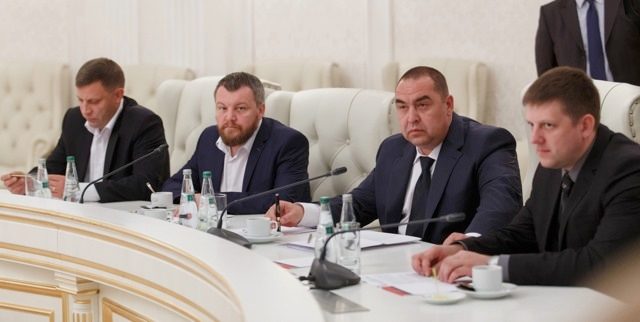SUMMARY
This is AI generated summarization, which may have errors. For context, always refer to the full article.

MINSK, Belarus – Kiev and pro-Russian separatists on Saturday, September 20, signed a deal creating a demilitarized zone in conflict-torn eastern Ukraine after fresh talks aimed at ending a brutal 5-month war.
Face-to-face talks began on Friday evening, September 19, in the Belarussian capital of Minsk and ended 7 hours later with an agreement to create the buffer zone and withdraw all foreign fighters and weapons from the area.
“We have signed a memorandum,” said Ukraine’s former president Leonid Kuchma, who was Kiev’s representative at the meeting.
Under the deal, both sides agreed to pull back heavy weapons by 15 km (9 miles) from their point of contact, thereby creating a buffer zone of “at least 30 km wide”, said Kuchma.
The OSCE would monitor the area, he said, adding that both sides also agreed to remove “all foreign armed groups, military equipment, fighters and mercenaries” from the zone.
Igor Plotinitsky, the leader of the self-declared breakaway Lugansk People’s Republic, said the agreement should lead to the creation of “a zone of complete security”.
The latest agreement builds on a European-brokered ceasefire sealed also in Minsk two weeks ago.
The elusive ultimate goal is to find a lasting solution to a conflict that has claimed around 3,000 lives and stoked Western alarm about Russia’s territorial ambitions.
The talks also follow a peace overture by Kiev this week that included approving legislation offering self-rule for separatist-controlled areas in the east and an amnesty for fighters.
That move was hailed by Russia but greeted with a mixed response by the insurgents, and by nationalist leaders in Kiev who fear Ukraine is capitulating to Moscow.
Crucially, Plotinitsky said the question regarding the status of rebel-held Lugansk and Donetsk regions was not broached at the latest round of talks in Minsk.
The fragile truce sealed on September 5 has overall dramatically scaled back the fighting across industrial eastern Ukraine. But sometimes deadly shelling and gunfire is reported almost daily around the flashpoint city of Donetsk.
With the crisis at a potentially pivotal point, US President Barack Obama hosted Ukrainian leader Petro Poroshenko at the White House on Thursday, September 18, with both condemning Russian “aggression”.
But the meeting underscored the limits of US support for Kiev in the most serious confrontation between Moscow and the West since the Cold War.
‘Blankets’ can’t win wars
Poroshenko sat side-by-side with Obama in the Oval Office and drew multiple standing ovations from lawmakers in a ceremonial joint meeting of both houses of Congress.
But Poroshenko’s appeal for NATO to grant Ukraine non-member ally status and for the shipment of weapons to help bolster its defenses were rebuffed, despite his warning that non-lethal aid like “blankets” cannot win wars.
Poroshenko told Congress that what he called Russian-backed proxy wars must be contained.
“If they are not stopped now, they will cross European borders and spread throughout the globe,” he said.
Shortly before his speech, Kiev accused Moscow of advancing 4,000 troops and weaponry based in annexed Crimea to the border with mainland Ukraine.
Obama condemned Russian “aggression” in Crimea and eastern Ukraine, which he said was designed to undermine the country’s territorial integrity and Poroshenko’s efforts to introduce reforms to fix an economy on the brink of bankruptcy.
But his administration will not send arms to bolster Ukraine’s armed forces, which in the days before the truce suffered major battleground defeats by rebels apparently backed by Russian elite troops.
Instead, a senior US official said Washington would offer Ukraine another $46 million (36 million euros) in non-lethal aid.
And on Friday, Poland – which has nervously watched Russia’s actions across the border – also said it would not send arms or otherwise get involved in the conflict.
The United States along with the European Union has hit Russia with a series of sanctions over its actions in Ukraine. The latest package targets Russia’s major financial, energy and defense companies.
But in a bid to ease another dispute, the EU said it would hold fresh talks with Russia and Ukraine on September 26 to thrash out a deal on gas deliveries, with fears of a disruption to supplies during the winter months.
Shelling in Donetsk
Although the ceasefire has largely held, shelling has rocked the main insurgent stronghold of Donetsk almost every night.
Donetsk city council reported the death of one civilian Thursday, while the Ukrainian military said two soldiers had been killed over 24 hours.
UN figures show that almost 2,900 people have lost their lives since the separatists unleashed their uprising against Kiev in April.
Poroshenko was in Washington two days after the parliament in Kiev ratified a historic pact with the EU in a further sign of his determination to take the former Soviet nation on a Western path. – Rappler.com
Add a comment
How does this make you feel?
There are no comments yet. Add your comment to start the conversation.